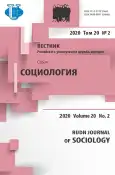The World War II and its falsification in the Russian youth representations
- Authors: Ponomareva E.G.1
-
Affiliations:
- Moscow State Institute of International Relations
- Issue: Vol 20, No 2 (2020)
- Pages: 307-322
- Section: Contemporary society: the urgent issues and prospects for development
- URL: https://journal-vniispk.ru/2313-2272/article/view/322804
- DOI: https://doi.org/10.22363/2313-2272-2020-20-2-307-322
- ID: 322804
Cite item
Full Text
Abstract
The events of the World War II play a special role in the contemporary social discourse as the basis of collective memory and civil culture. The current attempts of some Western countries to misrepresent and rewrite the history of the World War II and to belittle the role of the Red Army in the rout of Nazism pursue serious geopolitical goals. Effective opposition to the falsification of history depends on the quality of youth’s knowledge about that period (active historical memory) and the younger generations’ emotional association with the war winner. The article presents the results of the sociological study conducted on the eve of the 75th anniversary of the Great Victory. First, there was a survey at the Moscow State Institute of International Relations (students aged 18-23) to identify the level of historical knowledge and assessments, sources (fiction and movies) of representations, ideas about reasons for the falsification of the World War II history and measures to oppose it. The questions were divided into three groups: historical (the level of basic knowledge), cultural-pedagogic, or emotional (questions about books and movies) and evaluative-predictive (reasons for the falsification of history and measures to oppose it). The study also aimed at comparing the results of the survey with all-Russian opinion polls and foreign surveys. Second, the author analyzed estimates of the reasons for the falsification of the war history and suggestions to oppose this negative trend, which were provided by leading experts from Russian and foreign universities and analytical centers. The comparison of the students’ and experienced researchers’ opinions revealed both similarities and differences in generational estimates, and allowed to identify some general ways to resist the intensified trend of the falsification of the war history.
About the authors
E. G. Ponomareva
Moscow State Institute of International Relations
Author for correspondence.
Email: nastya304@mail.ru
доктор политических наук, профессор кафедры сравнительной политологии
Prosp. Vernadskogo, 76, Moscow, Russia, 119454References
- Alekseeva T.A. Teoriya mezhdunarodnyh otnoshenij v zerkale “nauchnyh kartin mira”: chto dalshe? [Theory of international relations in the mirror of the ‘scientific pictures of the world’: What is next?]. Comparative Politics. 2017; 8 (4) (In Russ.).
- Alperina S. Tankovy bog [Tank god]. https://rg.ru/2012/05/03/kino-poln.html (In Russ.).
- Volodin V. Pamyat o vojne [Memory about the war]. Istorik. 2020; 2 (In Russ.).
- Vspominaya tragediyu Hiroshimy i Nagasaki [Remembering the tragedy of Hiroshima and Nagasaki]. https://wciom.ru/index.php?id=236&uid=1903 (In Russ.).
- Vstrecha V. Putina s veteranami Velikoj Otechestvennoj vojny i predstavitelyami patrioticheskih obiedinenij [V. Putin’s meeting with veterans of the Great Patriotic war and representatives of patriotic associations]. http://www.kremlin.ru/events/president/news/62609 (In Russ.).
- WCIOM vyyasnil, kak rossiyane otnosyatsya k aktsii “Bessmertny polk” [WCIOM found out how the Russians perceive the ‘Immortal Regiment’]. https://ria.ru/20190507/ 1553313601.html (In Russ.).
- Galkovsky D. Neobkhodimo i dostatochno [Necessary and Sufficient]. Moscow; 2020 (In Russ.).
- Evropa zabyla o tom, kto osvobodil ee ot fashizma [Europe forgot who freed it from fascism]. https://ria.ru/20150428/1061370070.html (In Russ.).
- Ivanov V.N., Sergeev V.K. Veterany o Velikoj Otechestvennoj vojne: po materialam sotsiologicheskogo issledovaniya [Veterans about the Great Patriotic war: The results of the sociological survey]. RUDN Journal of Sociology. 2015; 15 (2) (In Russ.).
- Lyubimye knigi, filmy, pesni o vojne [Favorite books, movies and songs about the war]. https://fom.ru/Proshloe/12149 (In Russ.).
- Lyubimye filmy o vojne [Favorite movies about the war]. https://wciom.ru/ index.php?id=236&uid=9683 (In Russ.).
- Malinova O.Y. Konstruirovanie smyslov: issledovanie simvolicheskoj politiki v sovremennoj Rossii [Construction of meanings: The study of symbolic policy in contemporary Russia]. Moscow; 2013 (In Russ.).
- Mnenie: v Yaponii namerenno zamalchivayut, kto sbrosil bomby na Hirosimu [Opinion: in Japan, they deliberately keep silent about who dropped bombs on Hiroshima]. https://radiosputnik.ria.ru/20150806/1166494945.html (In Russ.).
- Monitoring mnenij: iyul — avgust 2019 [Public opinion monitoring: July — August 2019]. Public Opinion Monitoring: Economic and Social Changes. 2019; 4 (In Russ.).
- Pamyat o vojne: istoriya i mify [Memory about war: History and myths]. https://wciom.ru/ index.php?id=236&uid=9176 (In Russ.).
- Patriotism. https://fom.ru/TSennosti/14222 (In Russ.).
- Ponomareva E.G. Falsifikatsiya istorii Velikoj Otechestvennoj vojny — tekhnologiya transformatsii soznaniya [Falsification of the history of the Great Patriotic War — a technology for transformation of consciousness]. Observer. 2016; 5 (In Russ.).
- Rossiyane o Vtoroj mirovoj vojne: prichiny, soyuzniki, protivniki [Russians about the World War II: Causes, allies, enemies]. https://wciom.ru/index.php?id=236&uid=9869 (In Russ.).
- Rudakov V. Pamyat i bespamyatstvo [Memory and lack of memory]. Istorik. 2020; 2 (In Russ.).
- Sistemnaya istoriya mezhdunarodnyh otnoshenij [System History of International Relations]. Pod red. A.D. Bogaturova. Vol. 1. Moscow; 2006 (In Russ.).
- Tolko 22% rossiyan znayut, kogda nachalas Vtoraya mirovaya [Only 22% of Russians know when the World War II began]. https://ria.ru/20090831/183099475.html (In Russ.).
- Torkunov A.V. Mezhdunarodnye issledovaniya: haos ili plyuralizm [International studies: Chaos or pluralism?]. Political Studies. 2019; 5 (In Russ.).
- Heidegger M. Vremya i bytie: statyi i vystupleniya [Time and Being: Articles and Presentations]. Moscow; 1993 (In Russ.).
- Yadernaya vojna: ugroza ili mif? [Nuclear war: A threat or a myth?]. https://wciom.ru/ index.php?id=236&uid=9837 (In Russ.).
- Conference on Security and Co-operation in Europe. Final Act. Helsinki, 1975. https://www.osce.org/helsinki-final-act?download=true.
- Edelman M. Politics as Symbolic Action. Mass Arousal and Quiescence. Chicago; 1971.
- Hinckley S. No Obama apology at Hiroshima, but more Americans now say bombing was wrong. https://www.csmonitor.com/World/Global-News/2016/0510/No-Obama-apology-at-Hiroshima-but-more-Americans-now-say-bombing-was-wrong.
- Radchenko S. Did Hiroshima save Japan from Soviet occupation? https://foreignpolicy.com/2015/08/05/stalin_japan_hiroshima_occupation_hokkaido.
- Šubrt J. Memory and history: Some considerations on antinomies and paradoxes. RUDN Journal of Sociology. 2015; 15 (3).
Supplementary files









